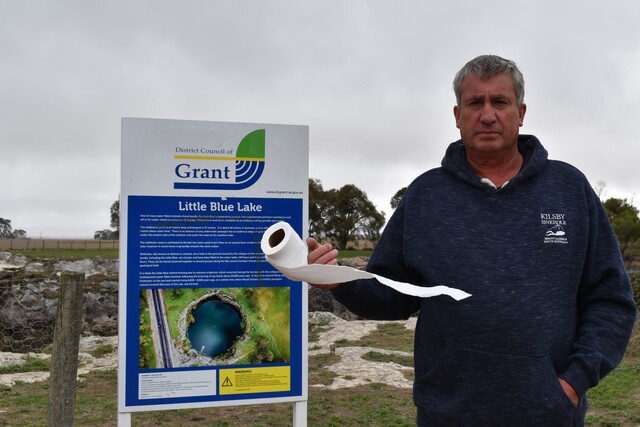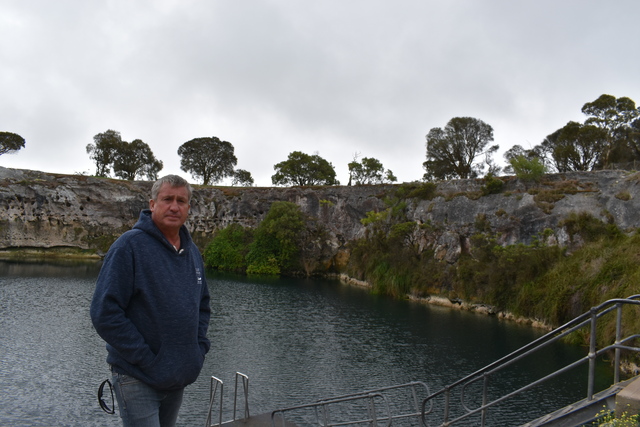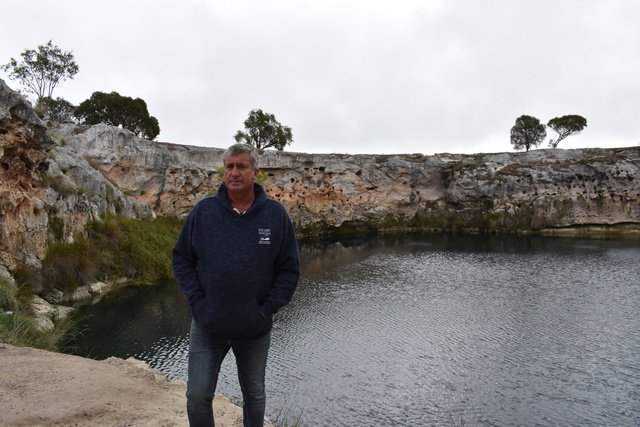
Sophie Conlon
A Moorak resident has called for the District Council of Grant and the Department for Environment and Water to take better care of sinkholes in the region, beginning with building a toilet block at the Little Blue Lake.
Graham Kilsby called for a collaborative approach between the local and state governments to bring the site up to scratch.
During council’s April meeting Mr Kilsby addressed the chamber and said sinkholes, like the Little Blue Lake, were the regions tourism drawcard, but they were slowly looking more terrible.
This, he said, was because people were urinating and defecating in and around the lake.
Speaking to The Border Watch, Mr Kilsby said he had seen and heard too many reports of people witnessing this and thought toilet facilities were crucial.
“Visitors come for a long period of time and there isn’t a toilet here on site, so you can only guess what’s happening,” he said.
“The amount of human waste around the top of the sinkhole as well is really concerning and that’s a health issue.”
Mr Kilbsy, who owns and operates the nearby Kilsby Sinkhole, said he had seen the Little Blue Lake change from a vibrant blue to green over the years, which he thought thanks to a dropping water level and increased excrement.
“This Little Blue Lake, when I was growing up it was clear it was blue, now it’s quite a dark colour, there is a lot of weed growth on the walls of the sinkhole,” he said.
“So in 20 to 30 years the lake has changed from what I grew up with.”
He said installing toilets would help tourism, which would benefit the state more than council, so building them should be a combined effort.
“Council don’t benefit from tourism much and it would be lovely if the state government could help fund some of these projects,” he said.
“It shouldn’t be directly funded by the ratepayers of the district, there should be some government support.”
While he said the need for toilets was the most pressing matter, Mr Kilsby said there were access issues with a number of nearby sinkholes which should be rectified.
He was also concerned there was no overflow carparking space at Little Blue Lake, which led people to park on the edge of the 110km/h road.
“When you are coming down the road at 110km/h you don’t necessarily know until you get quite close that there’s actually vehicles parked on the side of the road,” he said.
“So that’s an issue and then the speed being 110km/h road that too, I think is an issue when we have that overflow of traffic on the road.
Down the road, Mr Kilsby said the Sisters Sinkhole had become the “forgotten sinkhole”.
“The road there is quite rough,” he said.
“Some people come to our sinkhole and have driven halfway there and turned around and come back because they thought it was so rough there couldn’t be anything to visit on that road,” he said.
He said across the board, sinkholes needed more care and maintenance.
With more care, Mr Kilsby said they could be an even bigger tourism drawcard.
“People want to come and visit all the sinkholes, they are excited to come to the region,” he said.
“What we have here is unique, 85 per cent of Australian sinkholes are in our region.”
At the council meeting, elected members agreed there was work to be done, with councillor Karen Turnbull saying the Little Blue Lake was “one of those untouched places that we need to make sure we are looking after”.
Council chief executive Darryl Whicker said the lack of toilets was one which should be confronted in the short term.
The idea of creating a sinkhole advisory group was thrown around and it was voted a council briefing session would be held in the next two months to address the issues raised by Mr Kilsby.
A Department for Environment and Water spokesman said the Little Blue Lake and part of the car park was on dedicated crown land and managed by the District Council of Grant.
“While the remainder of the carpark is located on unalienated crown land, any proposals regarding development of facilities at the site should be directed to the council in the first instance,” the spokesperson said.









